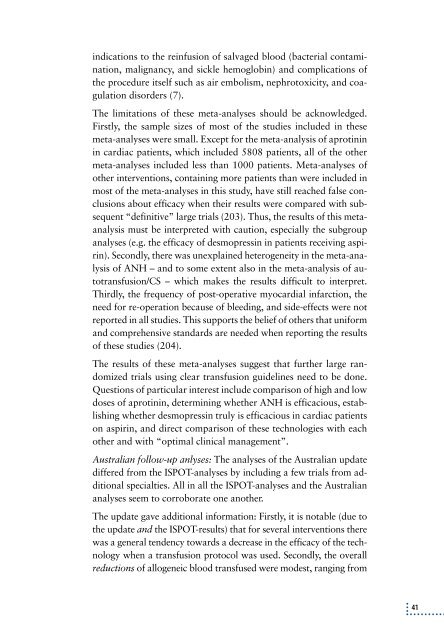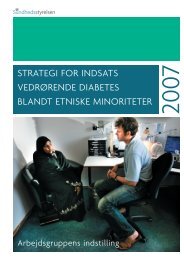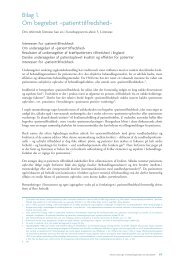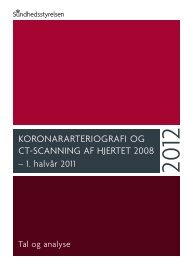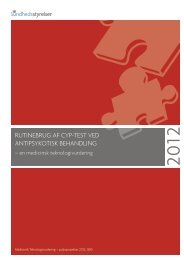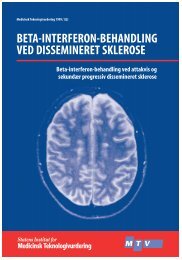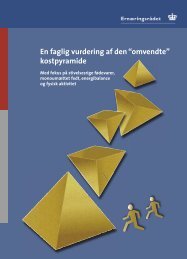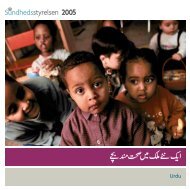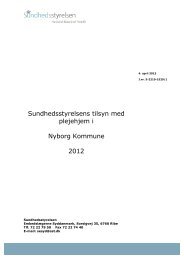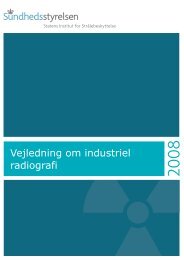Elektronisk udgave - Sundhedsstyrelsen
Elektronisk udgave - Sundhedsstyrelsen
Elektronisk udgave - Sundhedsstyrelsen
You also want an ePaper? Increase the reach of your titles
YUMPU automatically turns print PDFs into web optimized ePapers that Google loves.
indications to the reinfusion of salvaged blood (bacterial contamination,<br />
malignancy, and sickle hemoglobin) and complications of<br />
the procedure itself such as air embolism, nephrotoxicity, and coagulation<br />
disorders (7).<br />
The limitations of these meta-analyses should be acknowledged.<br />
Firstly, the sample sizes of most of the studies included in these<br />
meta-analyses were small. Except for the meta-analysis of aprotinin<br />
in cardiac patients, which included 5808 patients, all of the other<br />
meta-analyses included less than 1000 patients. Meta-analyses of<br />
other interventions, containing more patients than were included in<br />
most of the meta-analyses in this study, have still reached false conclusions<br />
about efficacy when their results were compared with subsequent<br />
“definitive” large trials (203). Thus, the results of this metaanalysis<br />
must be interpreted with caution, especially the subgroup<br />
analyses (e.g. the efficacy of desmopressin in patients receiving aspirin).<br />
Secondly, there was unexplained heterogeneity in the meta-analysis<br />
of ANH – and to some extent also in the meta-analysis of autotransfusion/CS<br />
– which makes the results difficult to interpret.<br />
Thirdly, the frequency of post-operative myocardial infarction, the<br />
need for re-operation because of bleeding, and side-effects were not<br />
reported in all studies. This supports the belief of others that uniform<br />
and comprehensive standards are needed when reporting the results<br />
of these studies (204).<br />
The results of these meta-analyses suggest that further large randomized<br />
trials using clear transfusion guidelines need to be done.<br />
Questions of particular interest include comparison of high and low<br />
doses of aprotinin, determining whether ANH is efficacious, establishing<br />
whether desmopressin truly is efficacious in cardiac patients<br />
on aspirin, and direct comparison of these technologies with each<br />
other and with “optimal clinical management”.<br />
Australian follow-up anlyses: The analyses of the Australian update<br />
differed from the ISPOT-analyses by including a few trials from additional<br />
specialties. All in all the ISPOT-analyses and the Australian<br />
analyses seem to corroborate one another.<br />
The update gave additional information: Firstly, it is notable (due to<br />
the update and the ISPOT-results) that for several interventions there<br />
was a general tendency towards a decrease in the efficacy of the technology<br />
when a transfusion protocol was used. Secondly, the overall<br />
reductions of allogeneic blood transfused were modest, ranging from<br />
41


